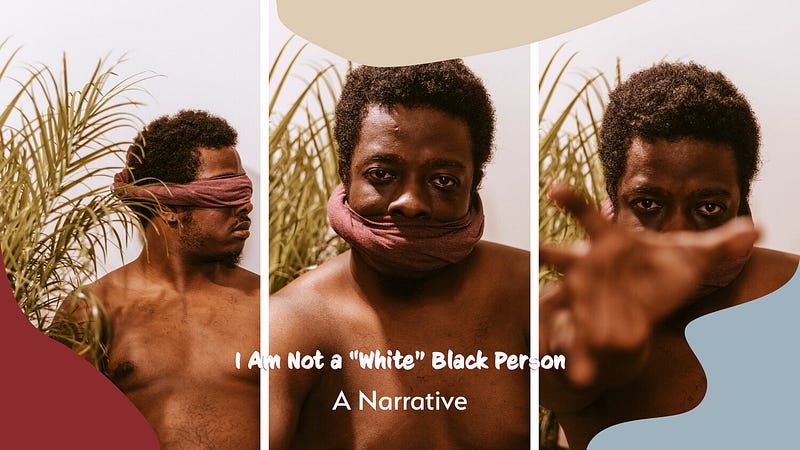I’m not a “white” Black Person: a narrative — ItsLarryG

Despite what you may have heard or what has been said in the past, I’m not a white black person. I’m black. I’m not African American. I’m black. And furthermore, I’m not the exception to the rule you have about black people. I am simply and proudly black.
To say I am a “white” black person is to deny my blackness. It is literally saying that my skin may be black but I act, speak, behave, dress, insert action here, white. Allow me to enlighten you on a few things. Attaining education, acting civil, speaking correctly, behaving with manners, wearing clothes that look good and fit properly, etc are not reserved for white people. White people are not the standard or barre to which everyone else is held. To call someone a “white” whatever when their skin color is clearly different is to deny their heritage and culture.
Let’s dig deeper. You may have called me your “white” black friend but that does not deny my black experience. I could be dressed to the nines and still have someone follow me around the store. I could speak perfect respectful English and still be seen as a threat. I can present someone with facts and informed opinions and still be written off. My dress, actions, behavior can be tossed aside because I “fit the description”. It can be disregarded because on the weekends I enjoy wearing basketball shorts. My achievements and accomplishments can be forgotten because I use slang when speaking with close friends or family.
My blackness is overlooked when it pleases white people, but the minute I start participating in my culture it is forgotten. I say participating in my culture but you may refer to it as acting black. But what exactly is acting black? I’m not even going to dignify this question with a response because doing so would only confirm your inherent racist ideas of black people and black culture. Many white people love everything about black culture except black people.
This response is usually refuted with “but you don’t act like those other black people” or “you’re not like them, you’re like me/us.” Normally this is where I’d agree, but I can no longer do that. I do act like “those other black people”, and I am “like them”. I participate in what the black community calls code-switching, feel free to look it up. I masked my identity to fit into a majority white private school, predominantly white university, and corporate white America. I suppress my tone, make my voice a higher pitch, and relax as much as possible to remove the appearance of being a threat.
Now we’re getting to the meat. I try to remove the appearance of being seen as a threat. We are taught to believe that black people are dangerous, more prone to crime, something to be feared. Tall black men who aren’t famous are perceived as threatening. Loud black women are seen as angry. These are what we call implicit biases. These are things that are taught subconsciously based on stereotypes. These can be reinforced by movies, tv shows, news media, propaganda, and a few lived experiences that solidify the idea.
I’ll allow you to do your own research on implicit biases. However, the point remains that I am black. I cannot change that. I did not choose it. I inherited a skin color trait from my parents. I was indoctrinated in the culture. My parents wanted me to have a better education, and that meant sending me to a private school, which happened to be mostly white.
I, like many of my peers, was taught to see past skin color while at school. We would be taught to treat everyone the same, but as I reflect on this teaching I’m reminded of how the black children were more likely to get in trouble for things everyone would do. Black children were made an example of disciplinary action. Black children were held to a different standard. They (we) were coerced (forced) to only behave like the “good” (white) children. This included but was not limited to: not listening to rap music, not wearing fashion that was popular in black culture, not allowing progressive or anti-establishment black literature, and reshaping our black ideals into a white box.
This suppression of culture, ideas, and identity herded me and other black children to either bond together over our shared culture or diversify and expand our palettes to at least be open to the things our white friends and classmates were interested in. Those of us who were open to accepting new culture and enjoy it were then labeled “white” black kids. As if our tolerance and acceptance of a different culture immediately dismissed or superseded our own inherited one.
And because this information and ideas are presented to a child’s mind which is still molding, many of us passed it off as a joke. We laughed about it. Some of us even embraced it without thinking about it because it meant that our white friends accepted us. We were one of them. But in reality, whether they knew it or not, they were denying our black culture and replacing their perception of us with their white one.
We became the “token black friend”. You know, the one who’s used in the argument, “I have black friends.” The one black friend that’s invited over for dinner. The one black friend in the group of 5. The black friend that listens to rock music. The black friend who can speak clearly and dress responsibly. We became their safe black friend. The black friend that absolves them of ever being racist. The black friend who enjoys things about “white” culture and isn’t going to embarrass them.
Allow me to restate my point. I am black. I am not white. I am not a “white” black person. Attaining education, acting civil, speaking correctly, behaving with manners, wearing clothes that look good and fit properly, etc are not reserved for white people and are not white culture. To deny my culture or my skin color is to deny a part of my existence. While your intentions may be positive, referring to me as your “white” black friend is no longer tolerated. I am black and my black experience is not monolithic. My black experience is multi-faceted, but it is still my black experience.
Originally published at https://www.itslarryg.com on June 19, 2020.
